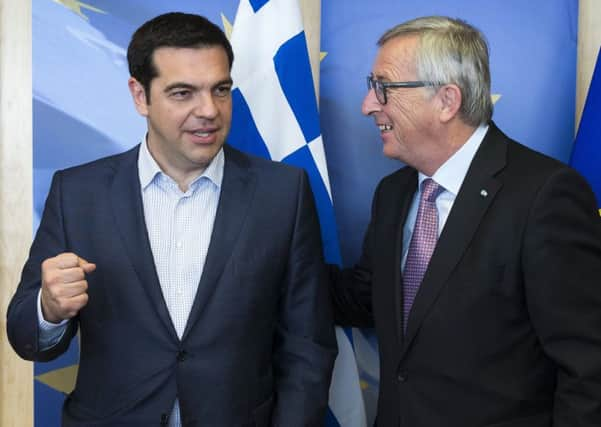Greece attacks IMF as EU crisis talks continue


The meeting was broken off at around 9pm, Brussels time and was due to recommence this morning.
Earlier in the evening, officials from the Athens government warned that talks were proving “tough”, but said he was optimistic.
Advertisement
Hide AdAdvertisement
Hide AdGreece’s representatives are in Brussels to negotiate what reforms its left-wing government should make to get more bailout loans. The country currently risks defaulting on its loans and falling out of the currency union.
The International Monetary Fund (IMF), a key creditor, has indicated that Greece’s proposed reforms are too focused on tax increases, rather than spending cuts.
Finnish finance minister Alexander Stubb said before the meeting that he would be “surprised” if a deal could be hammered out before this morning.
However, a Greek official said he believed that a “common will” would help resolve the crisis.
He said: “These are very tough negotiations… But there is a common will to get somewhere.”
The official said creditors were demanding, among other things, a freeze on pensions, scrapping some proposed taxes and surcharges on business, and higher sales tax on some goods.
“They are still stuck at the same red lines,” a eurozone official said after four hours of talks yesterday afternoon.
The Eurogroup of the finance ministers of the eurozone met on Monday night, but were unable to reach a decision due to the late submission of revised proposals by Greek prime minister Alexis Tsipras.
Advertisement
Hide AdAdvertisement
Hide AdGerman finance ministry spokesman Martin Jaeger said earlier yesterday that his delegation was heading to the meeting with “realistic expectations” and its impression was that plenty of work remains to be done.
He said Greece’s creditors had shown flexibility in talks about how much in budget savings the country should make in return for new bailout loans.
“We now assume that it is up to the Greek side now to move,” he said.
Greece needs more loans to be able to make a debt repayment on 30 June. If it fails to repay the £1.1 billion to the IMF by the end of the month, it faces default and possible exit from the euro single currency.
However, Mr Tsipras yesterday also criticised Greece’s international creditors for failing to accept his government’s latest reform proposals.
There were also rumours that Greece has rejected a counter-proposal put forward by the IMF, led by Christine Lagarde, seeking more pension and spending cuts.
Ms Lagarde set out her opposition to Greek proposals that focused on higher taxes to fill a big budget gap.
“You can’t build a programme just on the promise of improved tax collection, as we have heard for the past five years with very little result,” she told French media.
Advertisement
Hide AdAdvertisement
Hide AdBut Mr Tspiras took to his official Twitter feed to set out his argument. He tweeted: “The repeated rejection of equivalent measures by certain institutions never occurred before – neither in Ireland nor Portugal. This odd stance seems to indicate that either there is no interest in an agreement or that special interests are being backed.”
Mr Tsipras was set to hold another meeting with Jean-Claude Junker, president of the European Commission, late last night after the Eurogroup meeting ended.